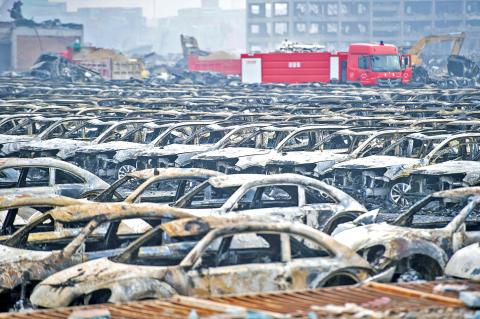Global automakers, including Volkswagen AG and Toyota Motor Corp, scrambled yesterday to assess damage to cars and facilities after two massive explosions in the port city of Tianjin, China’s largest automobile import hub.
The blasts that ripped through a warehouse storing volatile chemicals in the city late on Wednesday were so strong that they damaged buildings a few kilometres away.
French carmaker Renault SA said nearly 1,500 of its imported cars stored in a warehouse at the port had been burned while Toyota said the blasts broke windows at its car assembly, logistics and research buildings, which are jointly run with China FAW Group Corporation.

Photo: AFP
Operations at the Toyota facilities had been closed for a week-long summer holiday and no one was injured, but a spokesman at Japan’s biggest carmaker declined to say whether it could resume production as normal from Monday.
“In our current view, the damage isn’t that severe,” a China-based Toyota spokesman said.
Roughly 40 percent of cars imported to China pass through Tianjin’s port, or more than half a million units last year, according to Xinhua news agency. China imported 372.4 billion yuan (US$59.9 billion) in cars last year, official data show.
The blasts tore through an industrial area in the broader Tianjin port, killing at least 54 people, including a dozen firefighters, state media said.
Subaru maker Fuji Heavy Industries Ltd said more than 100 cars that were imported from Japan and were awaiting customs clearance in a warehouse had been damaged by broken windows. The warehouse, which does not belong to Fuji Heavy, is about 2km from the blast site, it said.
Volkswagen said that some of its imported cars were damaged but did not know exactly how many had been affected. Photographs from the scene showed rows of Beetles and other VW-brand cars badly scorched by the explosion.
“We have a task force in the area to find out more and which is primarily concerned with the wellbeing of our employees,” a VW spokeswoman said.
Ford Motor Co, Nissan Motor Co Ltd and Toyota also said they were checking their cars parked around the port.
South Korea’s Hyundai Motor Corp and Kia Motors Corp had a total of 4,000 cars near the blast site but did not have specific details on the extent of damage, the companies said.
BMW AG said it has two vehicle distribution centers near the port, but the damage was unknown given the area had been cordoned off by authorities.
Mazda Motor Corp said over 50 cars imported from Japan were also damaged, with peeling paint and scratches. One nearby showroom was shut on Thursday after its windows shattered, it said.
Other Japanese businesses with a presence in Tianjin including a mall owned by Aeon Co and an Isetan Mitsukoshi Holdings Ltd department store sustained minor damage. Otsuka Holdings Co said a factory that makes the Pocari Sweat sports drink would be closed yesterday and today as it assesses the site’s safety.
Shipping giant Nippon Yusen KK said it could not assess damage at a terminal it operates in Tianjin because the area was off-limits, adding that a few workers sustained minor injuries at an affiliated car distribution company, which was also closed.

NOT JUSTIFIED: The bank’s governor said there would only be a rate cut if inflation falls below 1.5% and economic conditions deteriorate, which have not been detected The central bank yesterday kept its key interest rates unchanged for a fifth consecutive quarter, aligning with market expectations, while slightly lowering its inflation outlook amid signs of cooling price pressures. The move came after the US Federal Reserve held rates steady overnight, despite pressure from US President Donald Trump to cut borrowing costs. Central bank board members unanimously voted to maintain the discount rate at 2 percent, the secured loan rate at 2.375 percent and the overnight lending rate at 4.25 percent. “We consider the policy decision appropriate, although it suggests tightening leaning after factoring in slackening inflation and stable GDP growth,”

DIVIDED VIEWS: Although the Fed agreed on holding rates steady, some officials see no rate cuts for this year, while 10 policymakers foresee two or more cuts There are a lot of unknowns about the outlook for the economy and interest rates, but US Federal Reserve Chair Jerome Powell signaled at least one thing seems certain: Higher prices are coming. Fed policymakers voted unanimously to hold interest rates steady at a range of 4.25 percent to 4.50 percent for a fourth straight meeting on Wednesday, as they await clarity on whether tariffs would leave a one-time or more lasting mark on inflation. Powell said it is still unclear how much of the bill would fall on the shoulders of consumers, but he expects to learn more about tariffs

Greek tourism student Katerina quit within a month of starting work at a five-star hotel in Halkidiki, one of the country’s top destinations, because she said conditions were so dire. Beyond the bad pay, the 22-year-old said that her working and living conditions were “miserable and unacceptable.” Millions holiday in Greece every year, but its vital tourism industry is finding it harder and harder to recruit Greeks to look after them. “I was asked to work in any department of the hotel where there was a need, from service to cleaning,” said Katerina, a tourism and marketing student, who would

i Gasoline and diesel prices at fuel stations are this week to rise NT$0.1 per liter, as tensions in the Middle East pushed crude oil prices higher last week, CPC Corp, Taiwan (台灣中油) and Formosa Petrochemical Corp (台塑石化) said yesterday. International crude oil prices last week rose for the third consecutive week due to an escalating conflict between Israel and Iran, as the market is concerned that the situation in the Middle East might affect crude oil supply, CPC and Formosa said in separate statements. Front-month Brent crude oil futures — the international oil benchmark — rose 3.75 percent to settle at US$77.01